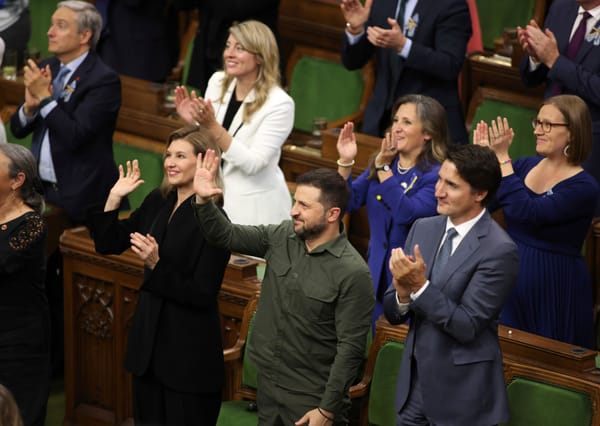Ukraine’s President Volodymyr Zelensky has been heralded as this century’s Winston Churchill: the brave leader of a nation fighting for freedom against a tyrannical, fascist foe. This makes it all the more embarrassing that he, along with the 338 members of Canada’s House of Commons, were made to stand up and applaud one Yaroslav Hunka, a 98-year-old veteran of the “First Ukrainian Division,” also known as the “SS Galichina,” or the 14th Waffen Grenadier Division, a military unit of Ukrainian volunteers for the Waffen SS—the paramilitary arm of the Nazi Party. The unit has been accused of war crimes in Poland, though news reports are as yet unclear on what the nature and extent of Hunka’s involvement was or the circumstances of his arrival in Canada.
“Vladimir Putin was handed a massive propaganda victory.”
Whatever we find out, one thing is certain: Vladimir Putin was handed a massive propaganda victory. He can now point to footage of a NATO member’s parliament honoring a Waffen SS veteran as proof of his narrative that Russia is fighting a sacred war against Western-backed Nazis in Ukraine. How could such a sorry spectacle have taken place? The answer points to contradictions within Canada’s multicultural settlement.
Canada is home to the largest Ukrainian population after Ukraine and Russia, and the high-profile presence of Ukrainian-Canadians in Canadian politics has led to a “special relationship” of sorts between Kiev and Ottawa. Canada was the first Western nation to recognize Ukrainian independence in 1991, and as soon as that independence was imperiled by Russia’s invasion in February 2022, Canada became a pillar of support for Ukraine’s cause.
At the center of this connection is Finance Minister and Deputy Prime Minister Chrystia Freeland, the most powerful figure in Justin Trudeau’s cabinet after the prime minister himself. A Rhodes Scholar and fluent Ukrainian speaker, Freeland was surveilled by the KGB on a student visit to the Soviet Union in the 1980s and marked as a nationalist agitator. She has followed in the footsteps of other prominent Ukrainian-Canadians, and may achieve even greater fame on the world stage as a possible future secretary-general of NATO.
In the 1960s, Ukrainian-Canadian leaders were instrumental in convincing the Canadian government that it ought to extend moral and symbolic recognition to ethnicities other than the dominant English and French ones, laying the foundations for the policy of official multiculturalism that is a keystone of the country’s self-image. It is fair to say that Ukrainians have contributed mightily and positively to the making of modern Canada. Yet the celebration of diversity can also be a double-edged sword, particularly when constituent ethno-national identities are indulged to the point of overlooking—or even valorizing—aspects of them that may be radically at odds with the promise of harmonious multicultural coexistence.
Last week, an international incident drew attention to the presence of militant separatist movements within Canada’s Sikh community; such movements keep alive the ancient hatreds and political loyalties that immigrants are ostensibly supposed to leave at the door when they accept citizenship in a new country.
A militant nationalist undercurrent also runs through Ukrainian-Canadian political identity. For instance, journalists in recent years have pointed to monuments honoring Ukrainian Nazi collaborators scattered across Canada, put up by Ukrainian nationalist groups. Freeland’s maternal grandfather became the subject of controversy in 2017, when Russian-affiliated media amplified reports that he had been the editor of a Nazi collaborationist newspaper in occupied Krakow. While this had nothing to do with Freeland herself, it highlighted the unsavory historical baggage that many postwar Ukrainian immigrants brought with them from Europe.
Perhaps somebody could have asked to see Hunka’s baggage. For it is likely that some person or organization with Ukrainian nationalist ties eagerly promoted Hunka to the powers that be, and in the rush to put on a good show for the visiting Zelenskyy, those powers failed a basic test of historical literacy.
Multiculturalism can mean many things and may indeed contribute to the shaping of a larger national story. Yet the fashionable idea of Canada as a post-national amalgam has often caused its leaders to celebrate (with unexamined enthusiasm) various sub-national or extra-national identities, treating these as stand-ins for the solid, unifying symbols and standards of previous ages, and blinding them to the serious moral and historical complexities that come with the promotion of diversity as an end in itself. The unfortunate tale of Yaroslav Hunka’s standing ovation is only a particularly egregious illustration of how thoroughly the Canadian political class has been captured by this attitude. It won’t be the last.
